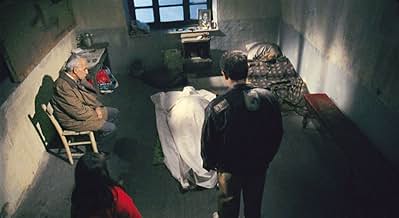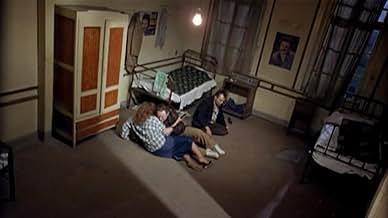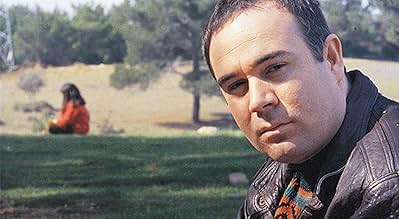Masumiyet
- 1997
- 1h 50min
VALUTAZIONE IMDb
8,1/10
21.459
LA TUA VALUTAZIONE
Aggiungi una trama nella tua linguaYusuf is released from prison after serving a ten-year sentence. He is scared of life outside as he goes to an address given to him by another prisoner.Yusuf is released from prison after serving a ten-year sentence. He is scared of life outside as he goes to an address given to him by another prisoner.Yusuf is released from prison after serving a ten-year sentence. He is scared of life outside as he goes to an address given to him by another prisoner.
- Regia
- Sceneggiatura
- Star
- Premi
- 20 vittorie e 2 candidature totali
Yalcin Cakmak
- Cezaevi Müdürü
- (as Yalçin Çakmak)
Recensioni in evidenza
All actors and acrtress are brillant. All scenes is so realistic. The scene planning and shooting angles show the emotion and stability very well. The film is both very static and progresses in a way that events can happen at any moment. The search adventure of the lead character with Disabled Girl could have been kept a little longer, but other than that, it is a Turkish masterpiece in every detail. You should definitely watch the same director's 'Destiny' movie right after this. I think it is the most impressive movie of the director who handles the sociology of the period very well and blends it with his art.
Demirkubuz sets out to explore the marginalized, the downtrodden and the hapless as he ends up provoking the audience to explore their own realities, to see if their grounding in existence holds up to such a merciless scrutiny. Devoid of all roots and conformities, his characters are free to roam the earth in search of peace and happiness in any way they can and perhaps in the only way they know how, in many instances in spite of themselves. That's a misfortune (or a fortune) depending on which side of the coin you prefer to look at. One thing is certain though, this coin looks shiny side up and once you pick it up off the dirty street, it will be too late to ignore the muddy flip side.
Innocence is a different Turkish film as it does not rely much on a visual style which is found in other Turkish films which have made their mark on international film festival scene. In this film, director Zeki Demirkubuz has filmed the tragic lives of ordinary people who don't have much left in their midst to improve their situation. In cinema, it is often shown that a character X leaves a place Y in order to go to Z. It is Yusuf, a main protagonist who experiences something similar as he is not able to finish his journey. However, he does not feel disappointed as he gets to learn that he has been useful to some people in his life. Innocence starts with a very unusual request made by an innocent man who has been released from prison. It is from that moment that the film creates its impact by depicting how Yusuf's life would change when he is going to come across vulnerable characters from small Turkish towns where life seems to have stopped for good. Lastly, viewers get to learn that Zeki Demirkubuz takes his cinema seriously as his film is a nice tribute to richness of Turkish cinema which is welcomed by this film's different characters when they sit quietly to watch classics of Turkish cinema on television.
Zeki Demirkubuz's sophomore feature, Innocence represents a marked stylistic departure from the fragmentation and narrative asymmetry of Block-C and converges towards what would prove to be more quintessential recurring elements within his body of work: long takes, painstaking observation of temps mart, stationary camera framing, the inclusion of a hyper-extended dialogue "ellipses" (or in the case of The Third Page, a monologue) that approaches abstraction, the running television as a surrogate for self-imposed isolation, and a temporal ambiguity that projects an epic scope to intrinsically intimate, chamber dramas. Opening to the shot of a recently paroled prisoner, Yusuf (Güven Kiraç), pleading his case before the warden to remain in jail despite having served out his sentence for murder and attempted murder, arguing that he has lost touch with his sole remaining family (the married sister whom he attempted to kill along with her lover, apparently on behalf of his abusive, but weak willed brother-in-law) and does not have the appropriate support system to survive in the outside world without resorting to crime once again, as the official's door repeatedly springs open for no apparent reason, the seeming randomness of the broken door (a recurring image in his films) becomes a metaphor for the ambiguity of his future. A strange and fateful encounter with a couple forcibly removed from the bus reinforces this sense of destiny. Arriving at a rundown boarding house in a rural town to rest for the evening, he comes to the aid of a little girl stricken with fever after her parents fail to turn up for the evening to claim her. Returning the next morning to the boarding house after their mysterious disappearance, the parents turn out to be the detained couple from the bus, a genial, but mercurial drifter named Bekir (Haluk Bilginer) and the elusive object of his affection, a wanton lounge singer, Ugur (Derya Alabora) (perhaps a wink to Josef Von Sternberg's The Blue Angel), who has been travelling across the country for twenty years (with Bekir ingratiating himself into her company) to be near her imprisoned first, "true" love. With little hope for reconciliation with his embittered and suffering sister, Yusuf returns for an indefinite stay at the boarding house and embarks on a friendship with the volatile couple. However, as Bekir and Ugur's relationship continues to be strained by the cumulative toll of their corrosive dysfunction, Yusuf, too, becomes drawn into their seductive, dark world of mutual self-destruction. Evoking the emotional intensity of an Ingmar Bergman chamber film and infused with the idiosyncratic combination of understated humour and soap operatic melodrama (not unlike the television programs that the lodgers watch each evening at the lounge), Innocence is an elegant, remarkably complex, and painstakingly rendered study of destructive obsessions and codependency. But beyond the psychological addiction that defines Bekir and Ugur's interminable journey to nowhere, Demirkubuz's framing of their relationship through the perspective of innocents, initially, through Ugur's deaf mute child, then subsequently, through the well-intentioned (and all too accommodating) Yusuf, Demirkubuz presents an intriguing portrait, not only of a pliable personality, but also the hypocrisy inherent in abusive relationships, where cruelty is rationalised by a sense of helpless, self-entitled victimisation.
You can see and feel life throughout the film with the help of players. All three have their choices for life, which they can fight for. And their choices bring them together in a strange world. Absolutely a wonderful story about pure feelings and life.
Lo sapevi?
- QuizIn the film, being innocent is represented as being silent. The innocent do not have a voice. Both Yusuf's sister and nephew and Ugur's daughter do not talk at all. Yusuf begins very silent and after he became more involved in things, he starts talking more.
- ConnessioniFeatured in Yeralti (2012)
I più visti
Accedi per valutare e creare un elenco di titoli salvati per ottenere consigli personalizzati
- How long is Innocence?Powered by Alexa
Dettagli
- Tempo di esecuzione1 ora 50 minuti
- Colore
Contribuisci a questa pagina
Suggerisci una modifica o aggiungi i contenuti mancanti

Divario superiore
By what name was Masumiyet (1997) officially released in Canada in English?
Rispondi



















